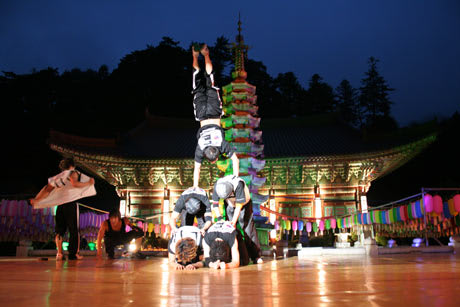Hip-hop cultures global appeal has long been cemented, yet much of its b-boying (or b-girling) element hasnt been documented since the cultures early days. Seminal movies like Wild Style and Style Wars, and more recent archival documentaries like The Freshest Kids, are essential primers for historical novices, but comparatively little authoritative material documents the modern-day b-boying movement.
Benson Lees Planet B-Boy goes a long way to rectifying this chasm. While the documentary starts with initial commentary and context from the likes of b-boying legend Ken Swift, Planet B-Boy wisely sidesteps much of the historical documentation that has been covered in the aforementioned movies and focuses on five crews who are competing in Battle of the Year, a b-boying championship held annually in Germany. If the movie only centred on the tournament, with its dizzying power moves, finesse and mind-boggling inventiveness from the crews and the tension of the tournaments climax alone, it would have been entertaining enough but Lee clearly has a loftier goal in mind.
The director follows the teams from Korea, Japan, France and the USA in the weeks leading up to, during and after the tournament, gaining insight into their familial pressures and cultural expectations, yielding unexpectedly genuine moments that are often touching, hilarious and shocking. Korean crew Last for One face up to looming mandatory military service while crew member B-Boy Joe struggles with his fathers expectations and a sense of unworthiness, his internal struggle etched on his face. Meanwhile, endearing 12-year-old Lil Kev of French crew Phase T visibly recoils in embarrassment at his mothers off-handed racism.
The b-boys struggles to affirm themselves in cultural environments where they are viewed as being on the fringes are captured in Lees visually arresting b-boy sequences in front of prominent landmarks such as the Arc de Triomphe and on the luminous streets of Osaka, at once showing the differences and the undeniable universality of hip-hop culture at the films heart and core.
(Mongrel Media)Benson Lees Planet B-Boy goes a long way to rectifying this chasm. While the documentary starts with initial commentary and context from the likes of b-boying legend Ken Swift, Planet B-Boy wisely sidesteps much of the historical documentation that has been covered in the aforementioned movies and focuses on five crews who are competing in Battle of the Year, a b-boying championship held annually in Germany. If the movie only centred on the tournament, with its dizzying power moves, finesse and mind-boggling inventiveness from the crews and the tension of the tournaments climax alone, it would have been entertaining enough but Lee clearly has a loftier goal in mind.
The director follows the teams from Korea, Japan, France and the USA in the weeks leading up to, during and after the tournament, gaining insight into their familial pressures and cultural expectations, yielding unexpectedly genuine moments that are often touching, hilarious and shocking. Korean crew Last for One face up to looming mandatory military service while crew member B-Boy Joe struggles with his fathers expectations and a sense of unworthiness, his internal struggle etched on his face. Meanwhile, endearing 12-year-old Lil Kev of French crew Phase T visibly recoils in embarrassment at his mothers off-handed racism.
The b-boys struggles to affirm themselves in cultural environments where they are viewed as being on the fringes are captured in Lees visually arresting b-boy sequences in front of prominent landmarks such as the Arc de Triomphe and on the luminous streets of Osaka, at once showing the differences and the undeniable universality of hip-hop culture at the films heart and core.
